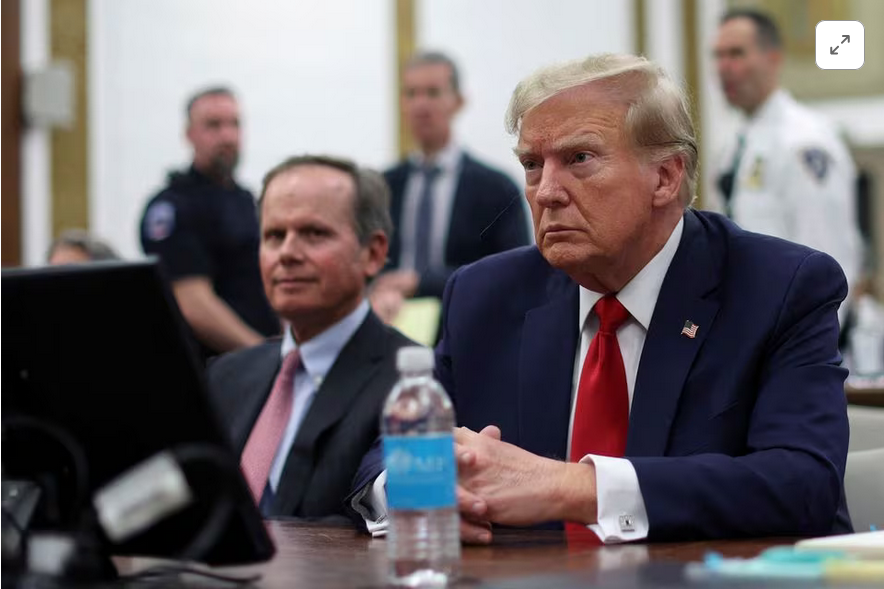
On Wednesday, former President Donald Trump sought the intervention of the U.S. Supreme Court. This came after Colorado’s top court disqualified him from the state’s Republican primary ballot. The disqualification was due to his alleged involvement in the events leading up to the Jan. 6, 2021, attack on the U.S. Capitol, according to an attorney representing the former president.
Trump, the leading candidate for the Republican 2024 presidential nomination, is challenging the recent ruling by the Colorado Supreme Court that disqualified him from holding public office due to a constitutional provision regarding involvement in insurrection or rebellion.
The state high court had already delayed its decision until Jan. 4, stating that Trump would stay on the ballot if he appealed.
The filing by Trump presents a highly charged case to the highest court in the country, which is currently dominated by a conservative majority that includes three justices appointed by him. The justices’ decision will have a significant impact on the ongoing campaign to prevent Trump from appearing on state ballots in future elections, particularly as the 2024 election approaches.
The attack was an alleged attempt by Trump’s supporters to challenge the outcome of the 2020 election, which Trump has disputed, claiming it was the result of irregularities.
The Colorado court’s groundbreaking ruling was a significant moment, as it utilised a rarely invoked provision of the U.S. Constitution’s Fourteenth Amendment to declare a presidential candidate ineligible for the White House.
Trump has filed an appeal with a Maine state court regarding a decision made by the state’s top election official. This decision barred him from the primary ballot in Maine, citing the same constitutional provision that was at issue in the Colorado case.
Clause regarding disqualification
A lawsuit was filed by Republican and unaffiliated voters, with support from watchdog group Citizens for Responsibility and Ethics in Washington. They sought to prevent Trump from participating in the nominating primary and future elections, citing the disqualification clause.
Section 3 prohibits individuals who have taken an oath to support the Constitution of the United States from holding office if they have engaged in insurrection or rebellion against the same, or provided aid or comfort to its enemies.
The amendment was ratified following the American Civil War of 1861-1865, during which southern states attempted to secede.
A recent ruling by the Colorado Supreme Court has overturned a previous decision made by a lower court judge. The ruling stated that while former President Trump may have incited his supporters to violence, he cannot be disqualified under the Fourteenth Amendment as he was not considered a “officer of the United States.”
A Colorado court has determined that Trump’s actions during the Capitol incident, where lawmakers were meeting to certify the 2020 election results, can be considered as engaging in insurrection. The court also found that the insurrection provision applies to the presidency.
“President Trump urges us to consider the implications of Section Three, which disqualifies individuals who have broken their oath from holding various offices, with one notable exception. This provision applies to both state and federal positions, except for the highest office in the country.” The majority wrote that both results are inconsistent with the plain language and history of Section Three.
Recognising the significance of the case, the majority emphasised their commitment to impartially applying the law, unaffected by public opinion.
Trump’s legal team asserted that his address to his supporters during the riot was shielded by his freedom of speech, contending that this constitutional right does not extend to U.S. presidents. They further argued that disqualifying a candidate would require a congressional vote.
Several lawsuits attempting to prevent Trump from appearing on the primary ballot in other states have been dismissed by the courts. The highest court in Minnesota rejected an attempt to disqualify Trump from the Republican primary in the state, however, it did not make a decision regarding his overall eligibility to hold the position of president.





More Stories
Flash Floods on Bank Holidays Damage roads and Railroads
Drake Disputes Charges of Underage Relationships in Kendrick Lamar’s Song
A Presidential Poll in Chad is Expected to end Military rule